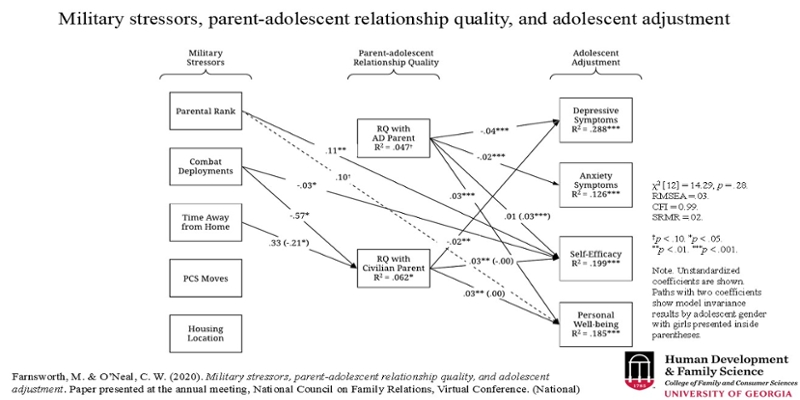Military families face challenges associated with military life, such as frequent/prolonged absences due to deployment and geographic relocations. With over half (51.5%) of active duty (AD) military service members being married and over one-third (37.3%) having children, military challenges can impact all members of the family system, and the family system can also impact members’ ability to cope with military life. Conceptualizing within the Contextual Model of Family Stress (Boss et al., 2016) and the ABC-X model (Hill, 1949) within it, the aim of this dissertation was to examine the role of family processes (e.g., family functioning, high-quality family relationships) as resources military family members utilize when experiencing stress (as evidenced by adolescents’ use of coping strategies, family members’ perceptions of military-related stress) and how these relate to family members’ outcomes (e.g., indicators of adolescents’ well-being, service members’ work-family impact). Study One examined the moderating role of family functioning for adolescents’ use of specific coping strategies and indicators of their well-being. The findings demonstrated that multiple coping strategies were uniquely related to indicators of military adolescents’ well-being, and although family functioning did not moderate the association between adolescents’ coping strategies and their well-being, family functioning was directly related to adolescent’s depressive symptoms. Study Two identified connections between family members’ perceptions of military-related stress, quality of family relationships, and service members’ work-family impact (specifically work-related guilt and work-related enrichment). The findings suggested that service members’ perceptions of military-related stress and adolescents’ relationship quality with both parents were related to service members’ work-family impact, specifically work-related enrichment. Such associations highlight the importance of high-quality family relationships, especially those with adolescents, for service members’ work-family impact, which has implications for military families but, more broadly, for service members’ readiness and retention. Together, these studies support existing literature on military family processes and offer some novel contributions for helping professionals, military leadership, and policy makers.
Library (2)
Research in Action (6)
News (2)
Showing library results for: Meredith20Farnsworth
1 The role of family processes for military family well-being
APA Citation:
Farnsworth, M. L. (2022). The role of family processes for military family well-being [Ph.D., University of Georgia]. https://esploro.libs.uga.edu/esploro/outputs/doctoral/THE-ROLE-OF-FAMILY-PROCESSES-FOR/9949450624502959#abstract
Focus:
Children
Parents
Couples
Branch of Service:
Army
Military Affiliation:
Active Duty
Population:
Adulthood (18 yrs & older)
Young adulthood (18 - 29 yrs)
Thirties (30 - 39 yrs)
Middle age (40 - 64 yrs)
Childhood (birth - 12 yrs)
Adolescence (13 - 17 yrs)
2 Peer aggression among children and youth: Defining constructs and identifying programming
APA Citation:
Frye-Cox, N., Farnsworth, M., O’Neal, C. W., Lucier-Greer, M. (2020). Peer aggression among children and youth: Defining constructs and identifying programming. Auburn, AL: Military REACH
Focus:
Children
Youth
Programming
Mental health
Military Affiliation:
Active Duty
Guard
Reserve
Population:
Childhood (birth - 12 yrs)
Preschool age (2 -5 yrs)
School age (6 - 12 yrs)
Adolescence (13 - 17 yrs)
MEREDITH FARNSWORTH: AWARD WINNER OF THE 2020 NCFR STUDENT/NEW PROFESSIONAL AWARD
STUDENT HIGHLIGHTS: MEREDITH FARNSWORTH, RESEARCH TEAM

Loading





